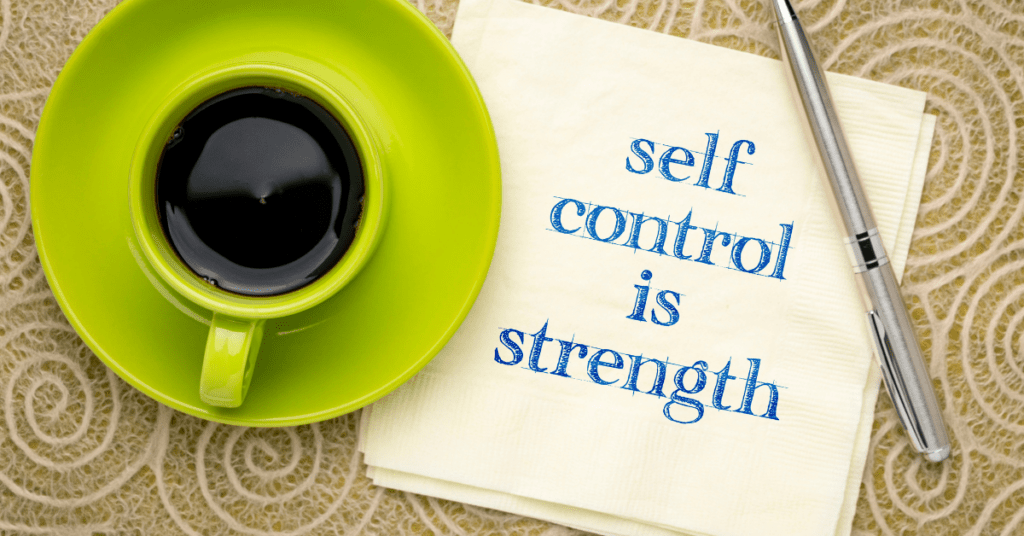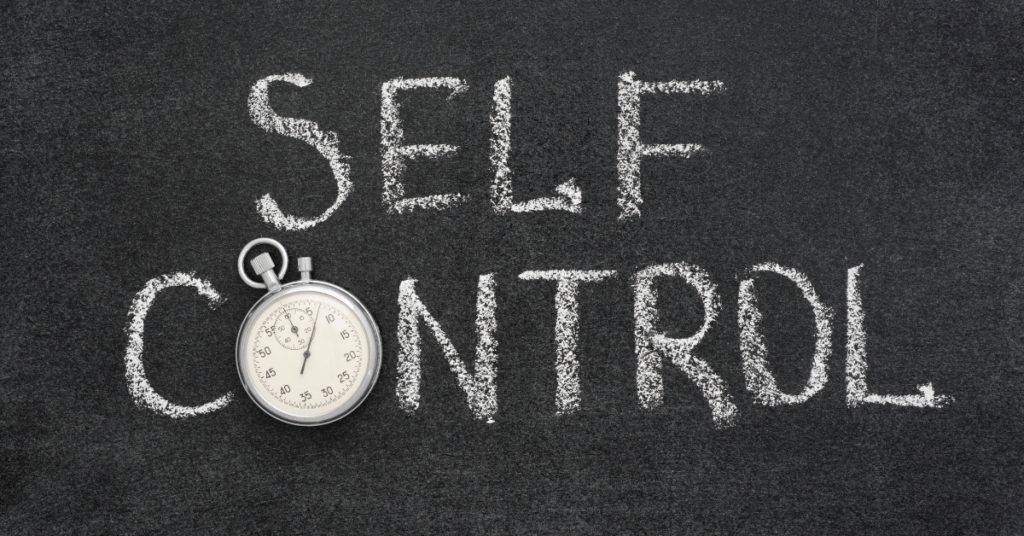Contents
What is Self-Control?

Self-control is the ability to control impulses, feelings, and desires. It’s the ability to say no when you want something that would be bad for you or someone else. Some people may think that they don’t have a lot of self-control because they can’t resist temptation. But anyone can develop self-control skills. The more self-control skills you develop, the easier it will be to make healthy choices every day. Start today by taking a deep breath before you react.
How Does Self-Control Handles Temptation?

Let’s look at some of the ways people with good self-control handle temptation:
They Know Their Goals
Good self-control means knowing what you need to do in order to meet your goals. Another way to develop self-control is by thinking about your goals (e.g., wanting to live longer or be healthier). Another way is how you can best achieve them (e.g., quitting smoking). Creating rules for yourself about what you will and won’t do in certain situations can also help support your goals, like hanging out with friends who don’t use drugs or drinking too much alcohol. This might mean setting boundaries that you’re willing to stick with, like saying no to an invitation to meet up with friends after work or school if you know it will make you too tired to get a good night’s sleep.
They Have Specific Rules for Themselves
People with good self-control often set rules for themselves about what they will and won’t do in certain situations. For example, some people might have a rule that they are not allowed to eat junk food or hang out with friends who are bad influences when they feel upset.
They Have Plan To Manage Situations
They always have a plan to manage the situations in which they are tempted. Maybe you will agree ahead of time to meet your friend at the library instead of meeting up at a restaurant or bar. Some people might think that they don’t have self-control because they can’t resist temptation. But remember that anyone can develop their own self-control skills! It helps to give yourself credit for all of your hard work—even when it doesn’t seem easy at first.
They Think About How Their Actions Can Impact Themselves
They can think about their actions and how they can impact them. You may also think about how it can impact other people before taking action. For example, maybe you could tell your friend that it’s important to you that they stop using drugs or drinking too much. You can then explain why. You might want to give them some ideas on how they can change their lives for the better. Try to make sure this is something they are interested in doing.
Benefits of Self-Control

The benefits of self-control are many; they include
- Increased mental health
- Helps you to achieve goals
- Helps you make healthy choices
- the ability to make better choices that affect you now and in the future, and the ability to do what you want when it’s appropriate.
- Self-control can also help you achieve your goals, live your best life, be more successful in relationships, and have an overall sense of well-being.
The more self-control skills you develop, the easier it will be to make healthy choices every day. This may mean eating right, exercising regularly, not smoking or using drugs, drinking alcohol only in moderation, avoiding risky sexual activity, and protecting yourself from exposure to sexually transmitted diseases.
Ways to Improve Current Level of Self-Control
There are many ways to improve your current level of self-control and take control over your impulses. Here is a list:
Take a Deep Breath Before You React

Although this can be hard at the moment, people who have good self-control know that taking a deep breath before they respond will help them think clearly and process what’s happening so they can respond in a way that allows room for empathy and compassion. This will also help them express themselves more constructively.
Be Aware of Choices Available To You
Sometimes we get stuck on autopilot because we don’t really pay attention to the things around us. Being aware of the choices that are available to you can be beneficial because it can help you make good decisions. For instance, if people around you are drinking and pressuring you to do something you don’t want to, then maybe it would be best for your mental health to go home or meet up with another friend who isn’t drinking.
Live In Present Moment

People with self-control try not to think about things they will regret later on (like trying out for the school play but blowing off practices). They focus on what they need to do right now.
Think About After-Effects
Think about how certain behaviors affect you and others on a daily basis. You can think of the long-term effects on your mental health and well-being. Make goals to change bad habits and replace them with good ones (i.e., instead of eating ice cream as a reward, try going for a walk or playing with your pet).
Learn Trigger Points
Learn what triggers impulsive behavior and figure out ways to avoid those triggers. Try finding distractions that can help you take back control over impulsive behavior (i.e., listening to music, counting backward from 100 by 7s). Practice mindfulness, which means focusing on the current moment and accepting it without judgment. Breathe deeply and focus on getting grounded at this moment before making any decisions or taking any action.
Get Enough Rest

Make sure you are getting enough sleep, exercise, and relaxation time to help prepare yourself for impulsive moments that may happen throughout the day. It’s also useful to keep a journal of any impulses so you can reflect on what triggers them and how you can avoid acting on impulse in the future.
Try Meditation
Try to meditate or take deep breaths when you feel the impulse to do something. Meditation will help you take back control over your impulses, rather than reacting to them at the moment.
Learn of Consequences of Your Actions
People who have a high level of self-control know that there are consequences for their actions. They try to weigh the pros and cons before they make any decision, including what the consequences might be if they choose to act on impulse.
Learn From Your Mistakes

People with good self-control try not to repeat the same mistake over again. If you do make a mistake, make sure you acknowledge it, learn from it, and move forward. Don’t let setbacks get in your way of achieving your goals or living your best life.
How to Develop Your Own Self-Control Skills?
Developing your own self-control skills means taking some time to think about the goals you have for yourself. You also think about how you can best achieve them.
For many people who struggle with their weight, it may mean starting by setting realistic weight loss goals that are achievable over a period of time. It can also be useful to set specific rules for yourself that are reasonable based on your circumstances (e.g., eat more vegetables), as well as planning ahead for situations where temptation might arise (e.g., buying healthy food at the grocery store). It can also be helpful to treat yourself with kindness and compassion when you make mistakes. Keep in mind that the more you practice self-control, the easier it will become.
Conclusion
Self-control is a skill that takes time and effort to develop. It can be very beneficial in many areas of life. Developing self-control skills means setting realistic goals for yourself, as well as having specific rules or guidelines you follow when making decisions. Practice mindfulness by focusing on the current moment without judgment, meditate if you feel an impulse coming on, and try not to repeat mistakes over again. Give us a call if you want to gain control over your life and take back command of your mind. We’ll be happy to help you in any way we can.
If you are looking for affordable Online Counseling MantraCare can help: Book a trial therapy session


